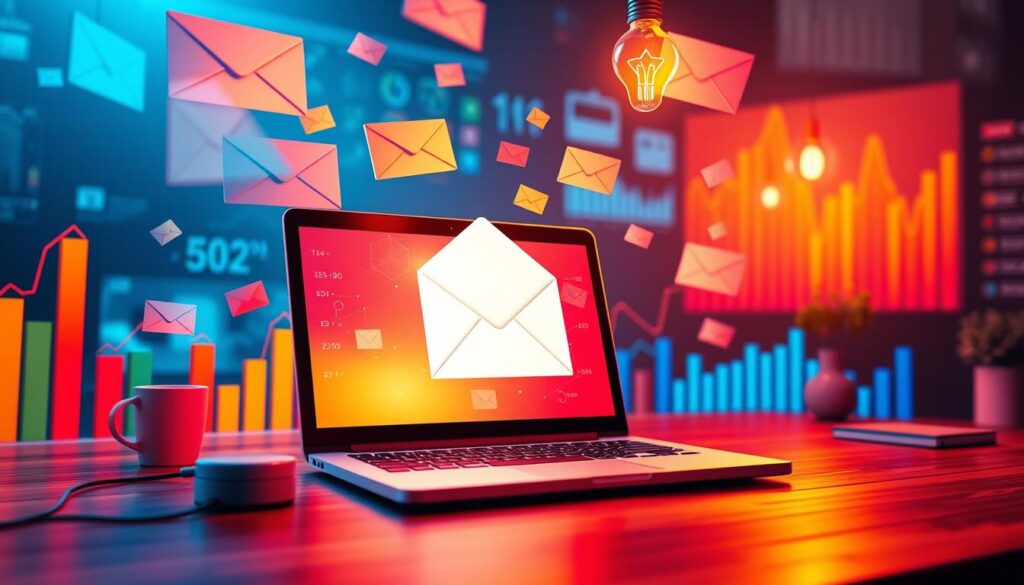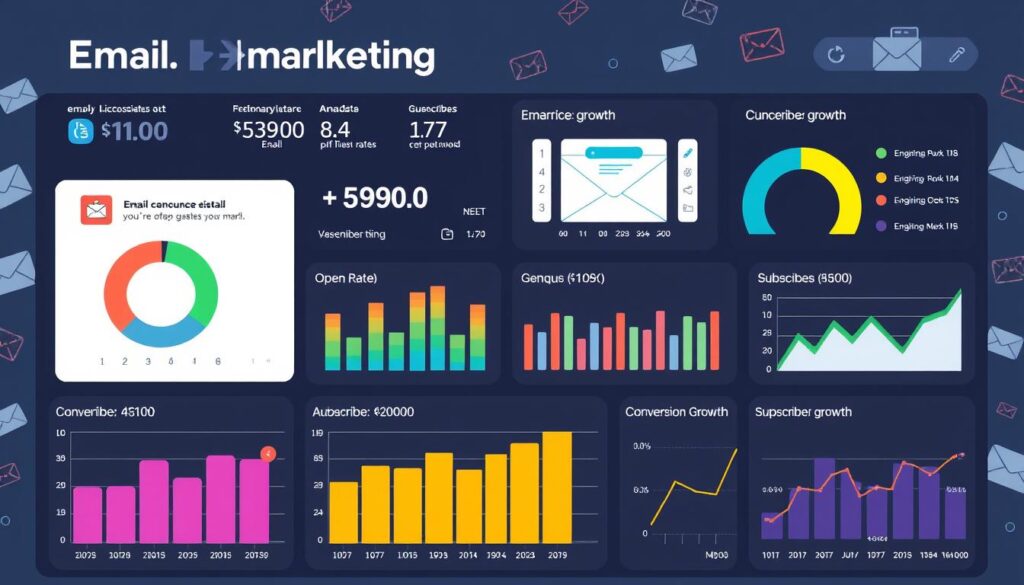Top Email Marketing Agency Services | Boost Sales
Email marketing is now a key way for businesses to connect with customers and grow sales. In today’s digital world, working with a top email marketing agency is more important than ever. I’ve seen how good email marketing can change a business for the better, especially with targeted campaigns.
Using an email marketing agency helps businesses create plans that boost sales and keep customers engaged. Making real connections through email campaigns can lead to more sales. It’s a key part of any good marketing plan.

In the next parts, I’ll explore more about email marketing. I’ll show how the right agency can help your business grow and succeed.
Key Takeaways
- Email marketing is crucial for building customer relationships.
- Utilizing a professional email marketing agency can greatly enhance sales.
- Targeted email campaigns are key to effective engagement.
- Leverage expert services to craft a successful marketing strategy.
- Personalized communication leads to higher conversion rates.
Understanding the Importance of Email Marketing
Email marketing is key to growing a business. It lets companies talk directly to customers, helping to build strong relationships. This approach can greatly boost sales and keep customers engaged.
The Role of Email Marketing in Business Growth
Email marketing is essential for business growth. It lets companies send personalized messages, making customers feel special. By sending content that matches what customers want, trust grows. This can lead to more sales, showing how important email marketing is.
Email Marketing vs. Other Marketing Channels
Many marketing options are out there, but email marketing has its own strengths. It offers a direct way to talk to people, unlike social media. Emails can also be sent to specific groups without extra costs, making them efficient. Plus, you can easily see how well your emails are doing. This makes email marketing a crucial part of any marketing plan.

Email Marketing Agencies: What to Look For
Choosing the right email marketing agency is key to your success. It’s important to know what to look for. This includes the agency’s experience and reputation. Here are the main things to consider when picking an agency.
Key Features of a Professional Email Marketing Agency
When looking at email marketing agencies, focus on certain key features. These show if they’re good at what they do. Here are some important aspects to consider:
- Segmentation Strategies: Being able to target specific groups can really boost engagement and sales.
- Creative Campaign Design: Unique designs can grab your audience’s attention and make your emails stand out.
- Proficiency in Analytics: Having access to detailed analytics lets you see how well your campaigns are doing and improve them.
- Automation Capabilities: Good automation can make your work more efficient and save time.
Evaluating Experience and Reputation
It’s vital to understand an agency’s experience and reputation. Here are some tips to help you:
- Client Testimonials: Check out what past clients have to say to see if they’re happy with the results.
- Case Studies: Look for examples of successful campaigns to see if the agency can deliver.
- Industry Recognition: Awards or recognition from respected organizations can show the agency’s credibility.

Email Marketing Agency Services: A Comprehensive Overview
Looking into the different email marketing agency services is key for businesses wanting to grow. There are many service types out there, each for a specific marketing goal. Picking the right ones can really boost your campaign’s success and your brand’s visibility.
Types of Email Marketing Services Offered
Email marketing agencies offer a range of services. These include:
- Email Campaign Management: This covers planning, designing, and sending out email campaigns to the right people.
- List Segmentation: This lets marketers split their email lists into smaller groups based on different criteria, making messages more relevant.
- Content Creation: Making content that grabs attention and is relevant to the audience is key for getting people to take action.
- Performance Tracking: Keeping an eye on how well campaigns do through metrics like open rates and click-through rates is crucial for getting better over time.
Understanding the Email Campaign Management Process
The email campaign management process has several steps to help marketers reach their goals. These steps are:
- Planning: Setting goals, figuring out who to target, and planning the campaign’s strategy.
- Design: Making emails that look good and are easy to use, matching the brand’s style.
- Execution: Sending out the campaign at the best time using advanced tools.
- Analysis: Looking at how well the campaign did to see what worked and what didn’t, helping plan the next one.

Crafting Effective Email Marketing Strategies
Creating strong email marketing plans is key to success. First, you need to set clear goals for your emails. This could be to get more people to open your emails, click on links, or keep customers coming back.
How to Define Your Email Marketing Goals
Having specific goals makes your email campaigns better. Here are some goals you might aim for:
- Increase email open rates by 15% over three months.
- Achieve a click-through rate of 10% in your next campaign.
- Grow your email list by 25% within six months.
- Boost customer retention by sending targeted follow-up emails.
With these goals, you can track and improve your strategies more easily.
Segmentation and Targeting for Better Engagement
Segmenting your audience is crucial for better engagement. By grouping people based on what they like, do, and who they are, your campaigns get a lot better. Targeting the right message to the right people at the right time leads to more conversions.
Here’s a simple table showing the difference between segmented and non-segmented emails:
| Aspect | Segmented Campaigns | Non-Segmented Campaigns |
|---|---|---|
| Relevance | High, based on audience preferences | Low, generic content for all |
| Open Rate | Typically higher | Generally lower |
| Click-Through Rate | Increased engagement | Often minimal engagement |
| Conversion Rate | Higher due to targeted content | Lower due to lack of personalization |

By focusing on clear goals and segmenting your audience, I’ve seen big improvements. Tailoring my emails to meet specific needs has made them more impactful.
Email Automation Services: Streamlining Your Campaigns
Email automation is key in today’s marketing. It helps me manage campaigns better, making communication with my audience more effective. Automation saves time and makes my emails more accurate, giving a better experience to my readers.
The Benefits of Email Automation
Using email automation brings many benefits. Here are some of the main advantages:
- Saves Time: Automating tasks lets me focus on creating new content.
- Improves Accuracy: It reduces mistakes, ensuring emails are sent right and on time.
- Enhances Personalization: Emails tailored to users can boost engagement.
- Increases Efficiency: Automated workflows make campaign management smoother.
Setting Up Automated Email Workflows
Setting up automated email workflows is easy. Here’s how I do it:
- Identify Key Email Touchpoints: Find areas where automation can help, like welcome emails or follow-ups.
- Choose the Right Tools: Use platforms like GetResponse or ActiveCampaign for effective automation.
- Create Engaging Content: Make messages that connect with your audience. Personalize them based on user preferences and actions.
- Test and Optimize: Keep checking your workflows for ways to improve, ensuring they get better over time.

Creating Targeted Email Campaigns that Convert
Making effective email campaigns means knowing what your audience wants. Getting insights is key to making strategies that speak to customers. You can gather this data through surveys, feedback, and watching how users behave.
Understanding Your Audience’s Needs
To make content that grabs attention, you need to understand what your audience wants. This knowledge leads to better engagement and higher conversion rates. I use several methods to get this insight:
- Conducting surveys to gather direct feedback
- Monitoring customer interactions and preferences
- Segmenting your audience based on demographics and interests
By focusing on what your audience needs, your email campaigns can offer relevant deals. These deals are more likely to turn recipients into customers.
Personalization Techniques for Higher Engagement
Personalization is now essential for email marketing. It boosts engagement by making emails feel more personal. Here are some ways to personalize:
- Tailored messaging: Use names and past purchases to make messages seem made just for them.
- Dynamic content: Change content based on what the recipient likes, like product suggestions.
- Timing and frequency: Send emails when people are most likely to read them and adjust how often based on how they interact.

Using these personalization methods strengthens your bond with your audience. It turns casual readers into loyal customers.
Measuring Success: Key Metrics for Email Marketing
Understanding my email marketing campaigns’ performance means looking at specific metrics. These key indicators give me a clear view of how my strategies are doing. By tracking these metrics, I can improve my future campaigns and get better results.
Open Rates, Click Rates, and Conversion Rates
Open rates show how many people opened my emails, helping me see if my subject lines work. Click rates tell me how many people clicked on links in my emails, showing if my content is interesting. Conversion rates show how many of those clicks led to actions like buying something or signing up. Here’s a quick comparison of these essential metrics:
| Metric | Description | Importance |
|---|---|---|
| Open Rates | Percentage of recipients who opened the email. | Indicates subject line effectiveness and audience interest. |
| Click Rates | Percentage of opened emails that resulted in a click. | Demonstrates content relevancy and engagement. |
| Conversion Rates | Percentage of clicks that led to a conversion. | Measures overall campaign success and return on investment. |
Using Analytics to Adjust Your Strategy
Analytics tools are my go-to for checking how my campaigns are doing. They let me see how my email marketing metrics change over time. This helps me spot trends and make choices based on what my audience likes.
By tweaking my strategies based on what I learn from these metrics, I keep getting better. This leads to more success in my email marketing.

The Best Email Marketing Tools for Agencies
Choosing the right email marketing tools is crucial for success. High-quality software makes creating emails easier and tracks results better. Mailchimp, HubSpot, and Constant Contact lead with easy-to-use interfaces and powerful features.
Top Software Tools for Campaign Management
MailerLite is known for its simplicity and great customer support. It offers detailed reports to help me see how well campaigns do. ActiveCampaign also shines with advanced automation and segmentation, key for reaching the right people.
Integrating with Other Marketing Platforms
Integration is key to boosting email marketing success. Linking email tools with CRMs like Salesforce or social media channels creates a strong strategy. This unity leads to better customer retention and more sales, vital for any agency.
FAQ
What is an email marketing agency?
An email marketing agency helps businesses with their email marketing. They manage campaigns, create targeted emails, and use automation. This helps businesses connect with their audience and increase sales.
How can email marketing boost sales for my business?
Email marketing can nurture customer relationships and drive engagement. It can also increase conversions, leading to more sales and business growth.
What should I consider when choosing an email marketing agency?
Look for an agency with expertise in segmentation and a good reputation. Check client testimonials and their experience in managing campaigns. Make sure they meet your marketing goals.
What types of email marketing services do agencies offer?
Agencies provide list segmentation, content creation, and performance tracking. They also manage email campaigns comprehensively. This helps businesses tailor their strategies for better results.
How do I define my email marketing goals?
Identify specific metrics you want to improve, like open rates or customer retention. Ensure your email marketing strategy aligns with your business objectives.
What is email automation and how can it help my campaigns?
Email automation services set up automated workflows for tasks like welcome emails and follow-ups. It saves time and provides a personalized experience for recipients.
How can I create targeted email campaigns that convert?
Understand your audience’s needs through surveys and behavioral analysis. Use personalization in your messaging to increase engagement and drive conversions.
What key metrics should I measure to assess my email marketing success?
Track open rates, click rates, and conversion rates. Use analytics to refine your strategies and improve performance.
What are the best email marketing tools for agencies?
Top tools include user-friendly campaign management software with robust reporting features. It’s beneficial to integrate these tools with other marketing platforms for a cohesive strategy.